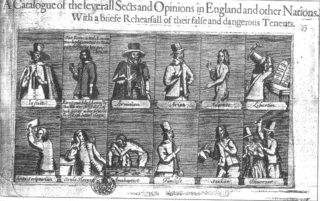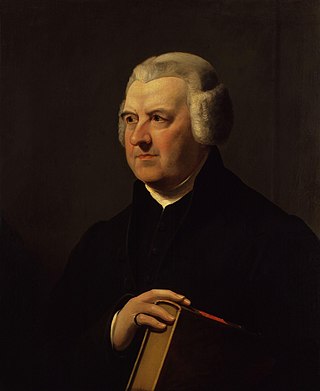
Nonconformists were Protestant Christians who did not "conform" to the governance and usages of the established church in England, and in Wales until 1914, the Church of England.

The Church of Ireland is a Christian church in Ireland, and an autonomous province of the Anglican Communion. It is organised on an all-Ireland basis and is the second-largest Christian church on the island after the Roman Catholic Church. Like other Anglican churches, it has retained elements of pre-Reformation practice, notably its episcopal polity, while rejecting the primacy of the pope.
Disestablishmentarianism is a movement to end the Church of England's status as an official church of the United Kingdom.

English Dissenters or English Separatists were Protestants who separated from the Church of England in the 17th and 18th centuries. English Dissenters opposed state interference in religious matters and founded their own churches, educational establishments and communities. They tended to see the established church as too Catholic, but did not agree on what should be done about it.

Abraham Rees was a Welsh nonconformist minister, and compiler of Rees's Cyclopædia.
Queen Anne's Bounty was a scheme established in 1704 to augment the incomes of the poorer clergy of the Church of England and by extension the organisation that administered the bounty.
Charles Hindley was an English cotton mill-owner and Radical politician who sat as Member of Parliament for Ashton-under-Lyne, Lancashire from 1835 until his death in 1857. He was active in the Factory Reform movement, in the opposition to the New Poor Law, and in opposition to state involvement in religious and educational matters, but was rarely prominent in them, being more sought after as a chairman of meetings than as a speaker at them, and too inclined to moderation and compromise to be accepted as a reliable leader. He was the first member of the Moravian Church to be a British member of parliament. A portrait of Hindley is in the collection of the National Portrait Gallery, London

Nathan Haines was an English priest who was vicar of St Mary's Church, Nottingham.
Events from the year 1673 in Ireland.
Richard Smyth was a minister of the Presbyterian Church in Ireland and politician.
Patrick Adair (1625?–1694) was an Irish presbyterian minister, notable for his part in negotiations with government for religious liberty and settlement through his career.
The dissenting academies were schools, colleges and seminaries run by English Dissenters, that is, Protestants who did not conform to the Church of England. They formed a significant part of education in England from the mid-seventeenth to nineteenth centuries.

Protestantism is a Christian minority on the island of Ireland. In the 2011 census of Northern Ireland, 48% (883,768) described themselves as Protestant, which was a decline of approximately 5% from the 2001 census. In the 2011 census of the Republic of Ireland, 4.27% of the population described themselves as Protestant. In the Republic, Protestantism was the second largest religious grouping until the 2002 census in which they were exceeded by those who chose "No Religion". Some forms of Protestantism existed in Ireland in the early 16th century before the English Reformation, but demographically speaking, these were very insignificant and the real influx of Protestantism began only with the spread of the English Reformation to Ireland. The Church of Ireland was established by King Henry VIII of England, who had himself proclaimed as King of Ireland.

The Presbyterian Church in Ireland is the largest Presbyterian denomination in the Republic of Ireland, and the largest Protestant denomination in Northern Ireland. Like most Christian churches in Ireland, it is organised on an all-island basis, in both Northern Ireland and the Republic of Ireland. The church has approximately 210,000 members.
William Harris, D.D. was an English Presbyterian minister.

In the spring and summer of 1715 a series of riots occurred in England in which High Church mobs attacked over forty Dissenting meeting-houses. The rioters also protested against the first Hanoverian king of Britain, George I and his new Whig government. The riots occurred on symbolic days: 28 May was George I's birthday, 29 May was the anniversary of Charles II's Restoration and 10 June was the birthday of the Jacobite Pretender, James Francis Edward Stuart.

John Scott Porter (1801–1880) was an Irish biblical scholar and Unitarian minister.

The history of religion in early Virginia begins with the founding of the Virginia Colony, in particular the commencing of Anglican services at Jamestown in 1607. In 1619, the Church of England was made the established church throughout the Colony of Virginia, becoming a dominant religious, cultural, and political force. Throughout the 18th century its power was increasingly challenged by Protestant dissenters and religious movements. Following the American Revolution and political independence from Britain, in 1786 the Virginia Statute for Religious Freedom disestablished the Church of England, ending public support and fully legalizing the public and private practice of other religious traditions.
William Campbell was an Irish Presbyterian minister.









